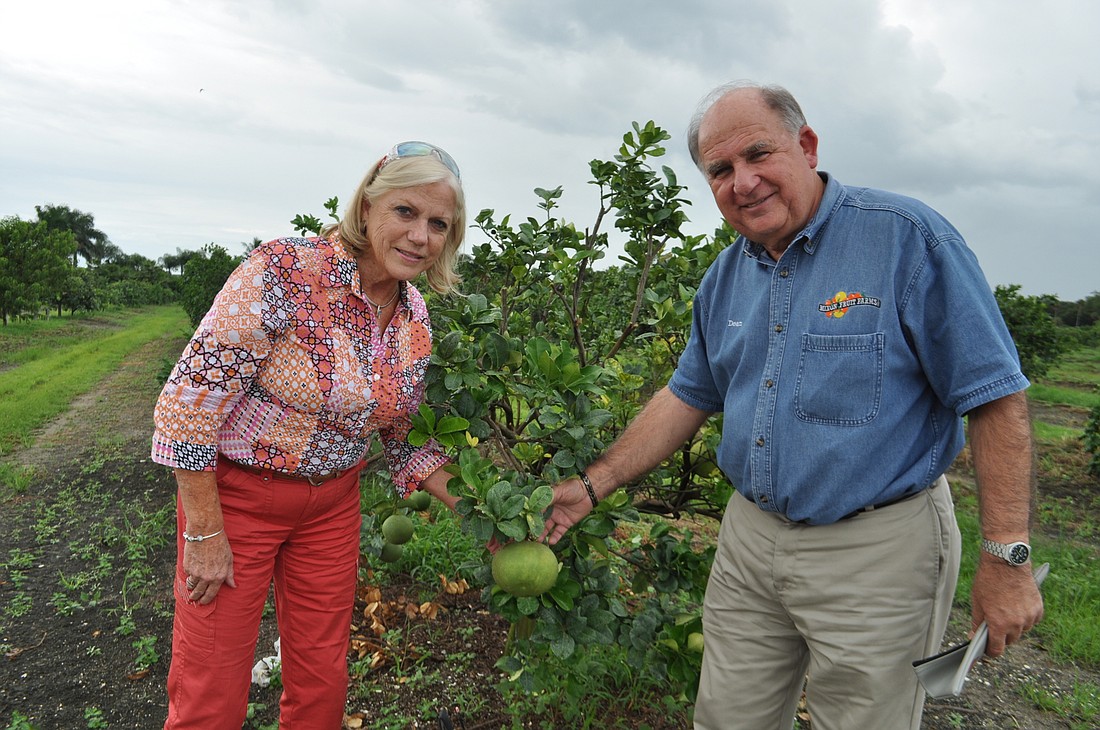- July 26, 2024
-
-
Loading

Loading

EAST COUNTY — Janet Mixon looks out on rows and rows of citrus trees at Mixon Fruit Farms.
Until 15 years ago, the 50-acre property had trees from the 1800s producing juicy oranges. Today, all the trees on the property have been replaced — some several times — due to citrus canker and citrus greening, diseases carried to the United States from foreign soil.
Citing an incident at Port Manatee in late June, in which U.S. Customs and Border Protection Office specialists found a first-in-port pest from Mexico (meaning it was the first time the pest was discovered in the port), Mixon says the United States needs to do more to prevent invasive species from wreaking havoc on American farms.
The insect, an Ozophora consanguine Distant, which typically targets grain crops, was found on a rambutan fruit, which was packaged with bananas and mangosteen. The container and its commodities were sent back to Mexico.
Janet Mixon and her husband, Dean, co-owner of Mixon Fruit Farms and a lifelong citrus grower, headed Sunday to Washington, D.C., to meet with U.S. Rep. Vern Buchanan, R-Longboat Key, and other legislators to discuss controls on imported produce and other goods.
“This was one reminder,” Janet Mixon said of the incident at Port Manatee. “To me, the fact they wait until it gets here (is a problem). It’s such a grand idea to let (produce) in; but it’s basically illegal immigration. It’s letting the (pests) in and letting (farmers) deal with it.”
The Mixons say the United States should have tighter controls on agricultural products entering the country to better prevent such incidences like the one at Port Manatee.
“The regulation should start on their side. It should be taken care of before it goes near land.” – Janet Mixon
Exported agricultural products should not only be inspected on U.S. territory, but exported crops should be fumigated while at their ports of their origin, and possibly while on ship.
“The regulation should start on their side,” Janet Mixon said. “It should be taken care of before it goes near land.”
The Mixons’ weeklong trip is part of an annual visit they make with the National Federation of Independent Businesses. The couple always focus on an issue to address with legislators.
Dean Mixon said cargo containers are spot-checked, so it’s feasible for foreign insects or other hazards to be overlooked.
Gary Bradshaw, president of SMR Farms, a subsidiary of Schroeder-Manatee Ranch, supports the idea of more regulations on imported agricultural produce.
“Nature deals enough curves to us to deal with on our own turf,” he said. “It’s tough. I know they have certain regulations, and I’m glad, at least, (this bug) was caught at our port. I guess that’s a fail-safe that’s here. I’m all for more stringent regulations coming into our country,” Bradshaw said.
The U.S. Department of Agriculture sets policy for agricultural products imported into the United States. Its Animal and Plant Health Inspection Service conducts an analysis and environmental review to determine potential pests likely to remain on the commodity upon importation and potential mitigations.
APHIS spokeswoman Abby Yigzaw said permits are required for importation into the United States, and APHIS makes sure “that all imported agricultural products shipped to the United States from abroad meet the agency’s entry requirements to exclude pests and diseases of agriculture.”
U.S. Customs and Border Protection carries out inspection procedures at ports and other points of entry.
Fred Ryner, public affairs officer for U.S. Customs and Border Protection who oversees Central Florida, including at Port Manatee, said all agricultural products imported in the country are inspected by agriculture specialists at sterilized port warehouse/cargo facilities.
“Everything is checked,” he said. “Even our fresh cut flowers brought in from other countries are inspected upon arrival to make sure there are no insects or bugs.”
Ryner said there’s always a possibility a pest could pass through the check system, but specialists are thorough and shipments are targeted based on the threat level from that country.
Contact Pam Eubanks at [email protected].